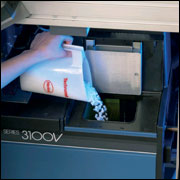 In 1896, when yogurt-loving Ludwig Müller first established his little Bavarian village dairy, he would not have conceived of the enormous growth that would take place over the next 100 years or so. Today, his grandson Theo runs a hugely successful business that operates right across Europe. In the United Kingdom, the company grew fast. In 1991 construction started on a £30 million state of the art production facility in Market Drayton, Shropshire. Just eight years later, Joanna Lumley officially opened the £24 million extension of the Müller warehouse and distribution facility. In 2001, a further £55 million factory extension was opened by The Duchess of York. Then, due to the success of Müller Vitality drinks, a new bottling plant for yogurt drinks was opened at the factory in Market Drayton.
In 1896, when yogurt-loving Ludwig Müller first established his little Bavarian village dairy, he would not have conceived of the enormous growth that would take place over the next 100 years or so. Today, his grandson Theo runs a hugely successful business that operates right across Europe. In the United Kingdom, the company grew fast. In 1991 construction started on a £30 million state of the art production facility in Market Drayton, Shropshire. Just eight years later, Joanna Lumley officially opened the £24 million extension of the Müller warehouse and distribution facility. In 2001, a further £55 million factory extension was opened by The Duchess of York. Then, due to the success of Müller Vitality drinks, a new bottling plant for yogurt drinks was opened at the factory in Market Drayton.
Of course, producing huge amounts of product also involves a great deal of packaging. In fact, at Market Drayton the company is producing up to four million pots of yogurt every day so it relies heavily on the packaging being both available and secure. And to help manufacture that packaging, Müller has come to rely on Henkel Technomelt Supra 120 adhesive as a vital part of the maintaining a smooth assembly process. In fact, there are three different production areas using the same adhesive to perform a variety of packaging formations.
“In one production area, known as P1, the adhesive is used on up to 13 machines to erect trays which are fed down to the filling lines,” explains Stuart Percival, Packaging Development Manager at Müller UK. “This is where yogurt pots are placed inside the trays, which are then palletised.”
Further, there is a bank of five machines – three or four are running constantly with one on standby – erecting 45 trays per minute just to supply the “Müller Corner” line.
“In P2 on the top floor there are nine machines erecting trays. Again these are fed on to the filling lines to accept filled pots of yoghurt, rice and other products. In P2 on the ground floor, the adhesive is used on five sleeving lines, that produce up to 120 sleeves of drinking yoghurt per minute. In turn these sleeved products are fed in to a case/tray packer where the cases are erected, again using the Technomelt Supra adhesive.”
Stuart continues: “We use Supra 120 for the reason that it can run across a wider range of temperatures and with reduced usage than other adhesives. What’s more, it can be used across all our machines and factory areas without issue.’
The adhesive needs a good heat resistance on the Müller Rice production line because the containers are filled hot, placed in the trays and then palletised.
“There is a tremendous build up of heat on a full pallet which the adhesive has to counter,” reports Stuart. “It then goes into a chill area, meaning the adhesive must have excellent cold properties as well.”
But those are not the only requirements. The sleevers run very fast and a stitch pattern of glue is applied by a pneumatic gun firing six times per second. As a result, the glue must offer a very clean cut off to prevent stringing and build up of adhesive on the machine.
Indeed, the characteristics of Technomelt Supra mean there is no clogging of the modules or nozzles, thus reducing the wear on machines and equipment and minimising cleaning. In turn, maintenance intervals can be extended, producing further economies.
Stuart Percival concludes, “We’ve had very few problems and none worthy of note. Any issues have been dealt with very quickly. We get great service from Henkel.”
Henkel Limited
Peter Brown Tel: 07767 802033
Craig Samuels: 07921 029164
www.technomelt-value.com




Comments are closed.